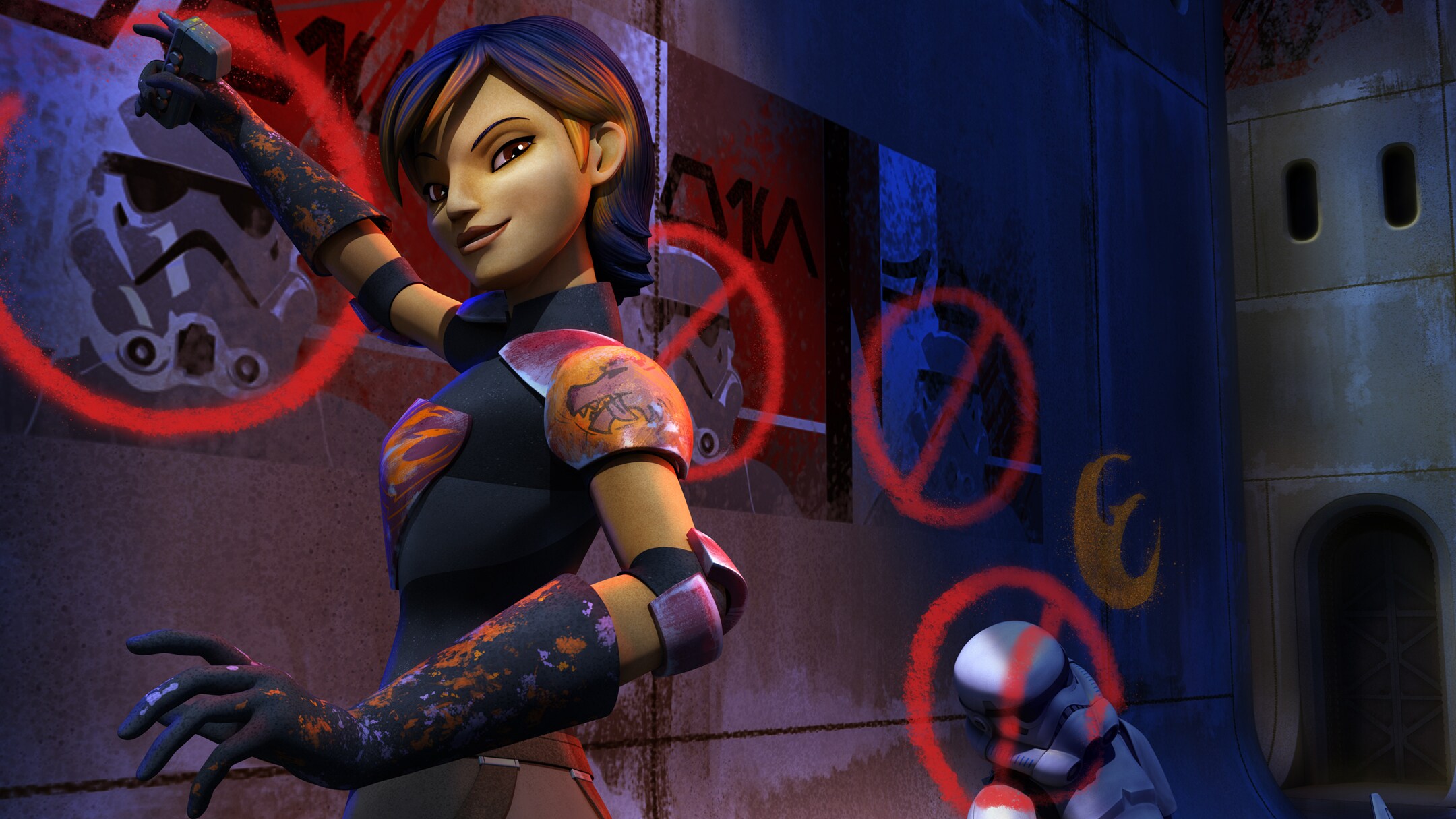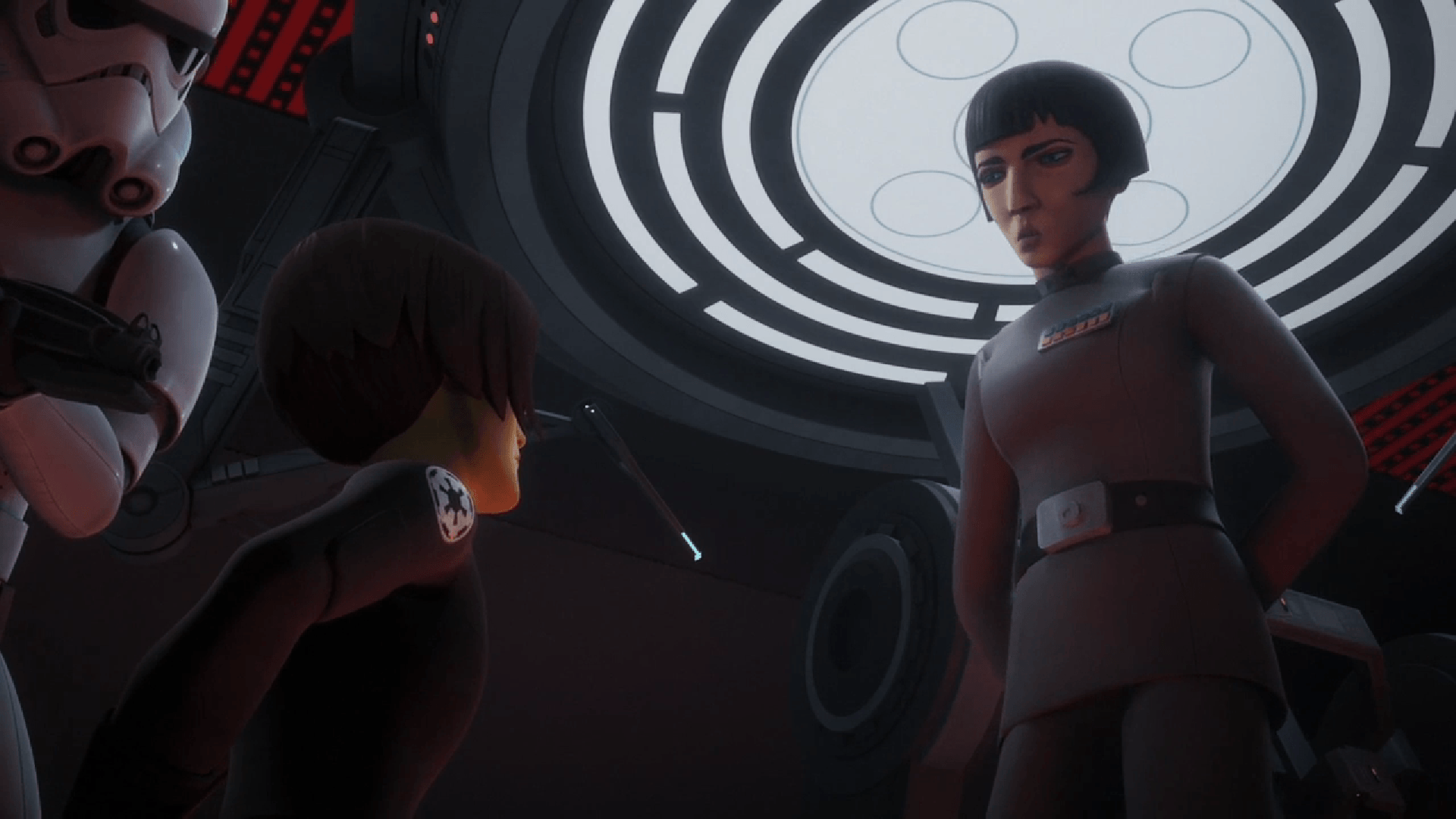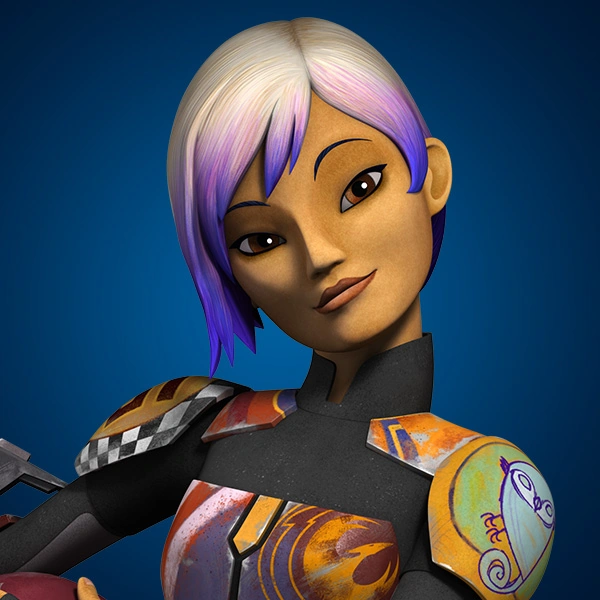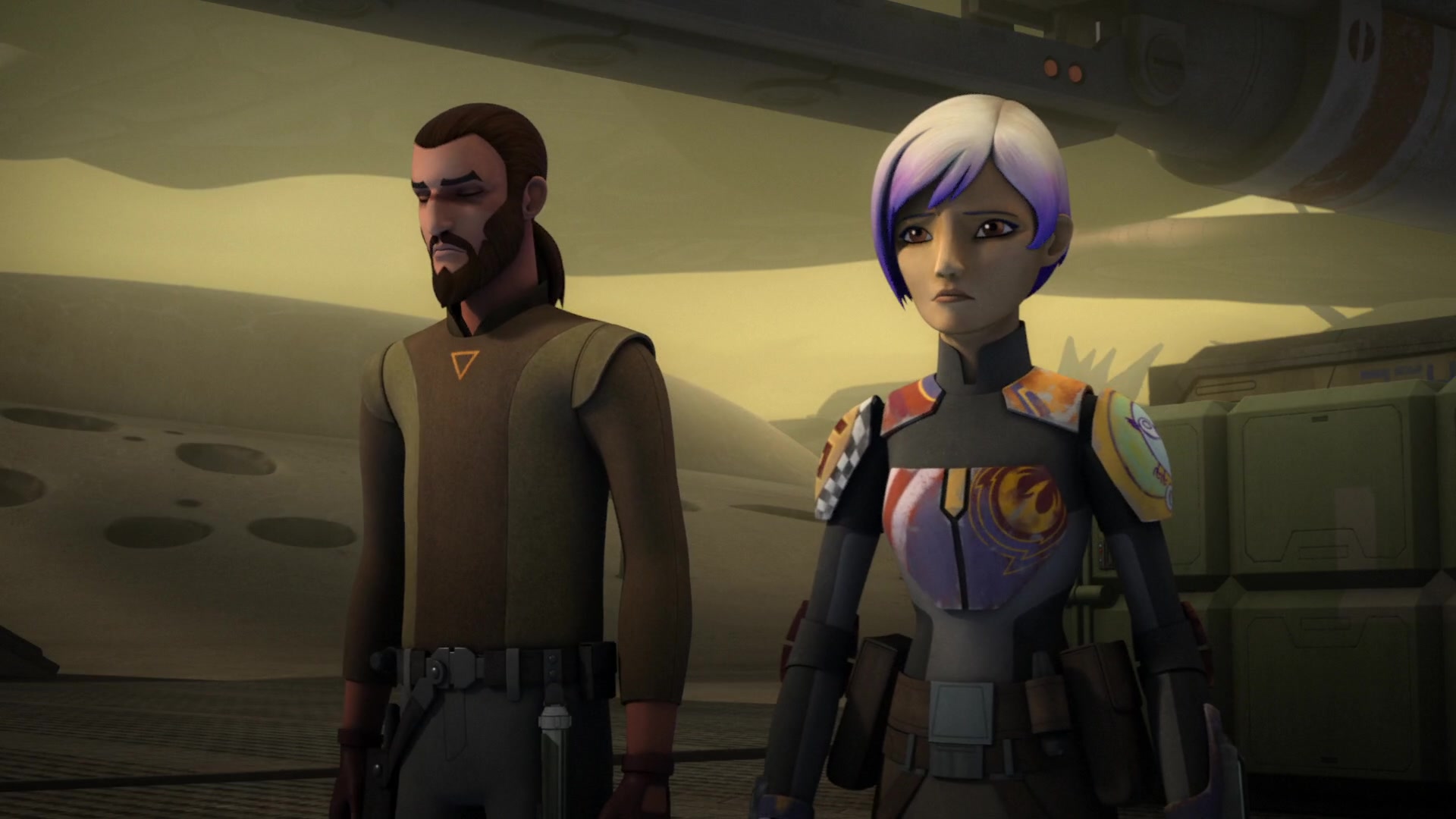About four years ago, I heard through www.borg.com that Disney was going to produce an animated Star Wars series. It was to be set five years before A New Hope, and it would star a Jedi who had escaped the Purge along with a Force-sensitive boy who would become his apprentice. I have said elsewhere that I love Jedi, so it is no surprise that they were the “hooks” which got me interested in this story. For me, they at first overshadowed another great character in the series: Sabine Wren, the sixteen year old (at the beginning of the story) Mandalorian on the team.
Now, discussing Sabine Wren means mentioning the “Strong Female Character” stereotype Hollywood and the usual suspects are praising these days, because that is what too many people want to see in her. I have maintained in my “Strong Women” posts that what really makes a woman powerful is her ability to think on her feet. She cannot always be physically stronger than the guys; in real life, it is very rare to find a woman who could match a man in hand-to-hand combat – let alone beat him.

Just consider Natasha Romanoff from Marvel Comics/Marvel’s films. Even with the combat training she endured from childhood and her variant of the Super Soldier Serum, Black Widow relies on speed, stealth, and surprise when she fights. The whole reason she yells “Hang on!” into her comm piece during The Winter Soldier is to surprise the pirates and get them to come to her. She does not beat the men with her superior strength; she beats them by being faster and fighting smarter, thus proving my point that it is not physical strength which allows a woman to fight. It is how a woman uses her own innate strengths – willpower, intelligence, speed, and doing the completely unexpected – which make her strong.
This brings us back to Sabine, who had the benefits of a Black Widow’s training without the bad elements. Aside from the fact that she is allowed to be kind and retain her femininity, she never physically overpowers her opponents with superior strength. More often than not she uses speed and creative thinking to take down her enemies – most of whom are taller and stronger than she is – keeping them off balance and doing her best to avoid giving them an opening to grab her. Sabine also knows how to shoot; when physical speed and prowess are inadvisable, she goes for her blasters, which she can use very effectively.
One of the episodes where Sabine best demonstrates my point about strong women is “The Antilles Extraction.” In that episode, Sabine has to fight Governor Pryce, the Imperial ruler of Lothal, to escape captivity. Pryce is taller than Sabine, more muscular, and completely lacking in any kind of feminine grace or charm. (She quite frankly strikes me as ugly, face on or in profile.) Despite this, Sabine manages to defeat the older woman by outthinking her.
There is something else worth mentioning here, a contrast of characters which will illustrate the difference between real strong women and the modern academy’s idea of what they want you to believe makes a “strong woman”: during their brawl, Pryce brags about her Imperial training, showing the depth of what she has sacrificed to become a part of Palpatine’s machine.
By this I do not mean the fact that she is willingly subjugating and destroying her own homeworld (Lothal). That is certainly part of it. But what I mean is that Pryce has sold her soul to the Dark Side. In so doing she has erased every mark of femininity from her bearing and visage, becoming less of a woman in the process.
Think about it, readers. Pryce does her best to look like the men she serves beside. Her manner is little different from Tarkin’s – colorless, stiff, cold, and distant. It is as though she does not want to be recognized as a woman. In fact, she does not; Pryce wants to be seen as a bigger, more important cog in the Emperor’s atheistic governing system. She has done everything but actually change her gender to look less like a woman and more like a man.
Sabine has done the exact opposite. Her armor is not designed to hide her femininity; on the contrary, it practically screams it to the galaxy. And, despite the fact that she keeps her hair short to fit under her helmet (and probably to keep people from grabbing it), she colors and cuts her hair in ways that make her stand out as a young woman (even that hairdo we see her wearing at the end of the series didn’t really undermine her femininity). Unlike many modern “examples” of so called “strong women” Sabine actually fits the role, demonstrating that a woman fights not out of anger or hatred, but to preserve the beauty and wonder she sees and loves around her. Truly strong women resemble Sabine, while faux strong women more often than not look like Pryce.
This brings us to another point I want to make about her. While I am not a fan of abstract art – modern or in a galaxy far, far away – Sabine’s painting and artistic side have never bothered me the way they have other viewers of the show. Instead of following the “Strong Female Character” template demanded by the academic/journalistic complex, the Rebels’ writers created a heroine who is unafraid of being “girly.” This adds to her character and personality; she may make her living fighting, but being a warrior does not define who and what she is. It is a valuable part of her, but it is not the whole of her.
What really intrigued me about Sabine Wren, however, was her implied vulnerability. From the beginning it was clear that she ached with some past wrong, and I wanted to know what it was. We got some hints but they were frustratingly inconclusive. I nearly went nuts trying to figure out her past, but my sanity was saved with the knock out episode “Trials of the Darksaber.”
Still, Sabine’s speech in this show about how her family abandoned her bothered me a fair bit. Part of the rallying cry which nearly destroyed Western culture and the United States in the 1960s, and is being reprised yet again today, was that young people knew how to heal the world and all its ills better than their elders. The implication in this thought was that the youths of the time were being prevented from showing their brilliance and making the world a better place by the adults in their lives. A well-known catchphrase from the period states that teens and twenty year olds must “never trust anyone over thirty.”
Unfortunately, this attitude is still alive and well, reverberating down through the years into today in our culture. It is also present in a lot of modern literature, film, and television stories. So I worried at this problem in Sabine’s speech for the week leading up to “Legacy of Mandalore,” which gave me the missing puzzle piece for the answer to her explosive outburst during “Trials.”
Allow me to explain: Imperial cadets, according to Rebels, are accepted into Stormtrooper and officer’s training as young as fourteen. Sabine had to have been fourteen or even thirteen when she entered the Imperial Academy on Mandalore. This meant that she was suffering from a case similar to the one running rampant in the 1960s.
One of the things every boy and girl, no matter how bright and talented, has at the age of thirteen/fourteen is a rather simplistic view of life. They are still young enough at that age to believe in their family and friends, wholeheartedly. They are also naïve enough not to recognize all the dangers lurking in their society and in the world outside of their culture.
Sabine was young enough to think she could run to her parents and tell them what the Empire was doing, thus spurring them to fight against it. If they did not listen to her, then she would start a glorious revolution against the Imperials with other young Mandalorians to free her people from their tyranny – which is, sadly, what many youths in the ‘60s and today are trained to imagine. Like these misguided young people, Sabine failed to realize up until “Legacy of Mandalore” that things do not work out so easily in real life.
Mandalore was thirteen or fourteen years past its last internecine conflict and a galactic civil war when Sabine broke the news to her people about the Empire’s treachery. Too much of Mandalore’s already limited population had perished in that pointless conflict and, on top of this, a Galactic Empire powerful enough to wipe out the Jedi Order – roughly a thousand knights strong – had just taken over the galaxy. Furthermore, said Empire had also easily commandeered Mandalore’s government, essentially conquering them without firing a shot. The Mandalorians who did not bow to the Empire in their hearts looked around at their losses, saw that more would result from another fight, and said, “We are not going through that hell again. Not now.”
Ursa and Alrich Wren knew this. Many of Sabine’s friends, who may have agreed with her, realized they were not going to get support from their clans or anyone else on Mandalore to start a fight with the Imperials. Sabine did not realize any of this – not completely, at least. She certainly did not see any of these things the way an adult would. Or she thought these obstacles could be overcome more easily than they were. After all, what is pain and loss to someone who is motivated by justice?
Sabine failed to realize that even those who love and respect justice can be tired or frightened. I think that, when she told her parents about the weapon she had created for the Empire, they believed her story. They knew she was telling the truth, that the Empire did not just want to rule them, it wanted to eradicate them. But they did not have the power to act on Sabine’s warning, so they tried to tell her to stop talking about it and wait for a better time to act.
Naturally, their daughter would not and could not do that. Already guilt-ridden over the Mandalorians she had helped the Empire murder, the thought of staying silent long enough for the Empire to kill more of her people probably made Sabine sick. So she kept talking, leaving her family with no way to protect her while she stayed on Mandalore. That meant their only recourse was to force her to run away by calling her a traitor and a coward. Because she was so young, Sabine perceived this as “abandonment” when it was actually a last-ditch effort by her immediate family to protect her the only way they could.
I believe that if the Wrens had had a better way to protect her and begin a resistance to the Empire, they would have taken it. But their choices were to let the Empire kill Sabine or, almost as bad, make her run away from home. At least if she ran, she would be alive. Letting the Empire and the other clans kill her would mean they would never get their daughter and sister back.
And that, readers, is where “Legacy of Mandalore” comes in. Here Ursa practically admits to her daughter that she pushed her to run away to save her life. Countess Wren could protect Tristan and their clan with some fancy political maneuvering, though that meant her husband would have to go to Mandalore’s capital as a veritable hostage to ensure their good behavior. The only member of her family she could not protect if she remained on Mandalore was Sabine.
For five years, however, her daughter did not see this. Maybe she did not see it until her mother shot Gar Saxon to save her life. This is why she is so distrustful at the beginning of Rebels. It is also why she adopts Hera, Kanan, and Zeb as her surrogate family.
In some ways, it is funny how Sabine’s adoptive family/crew is different from her real family. Hera, obviously, has been the mother for the crew from the beginning. Although the Twi’lek is “forged” for and by war, her general deportment is warm and nurturing. Even when Hera has to get sharp or shout, her voice lacks Ursa Wren’s steely bite and commanding snap. Their attitudes could not be more different, but Sabine loves and respects both women equally.
Zeb is not at all like Tristan Wren. I still do not know if Sabine is younger or older than her brother, but the impression I have is that Tristan is not her kid sibling. Zeb early on showed an older brotherly protectiveness for the young Mandalorian girl, usually by pulling her toward him in order to shield her from explosions. When the crew temporarily lost the Lasat in “The Honorable Ones,” both Sabine and Ezra ran up to him with the excitement which youngsters show when they greet an older brother feared lost forever. So Zeb has definitely filled the role of brother for her for five years.
Most impressive to me, if only for the fact that it was never shown enough, was the father/daughter connection between Sabine and Kanan. While it was nice to learn that Alrich Wren was responsible for his daughter’s interest in art, I was rather disappointed that he was never shown wearing Mandalorian armor. I could certainly see Alrich “fighting using his art” and being less severe than his wife but, to me, it would have been more fitting if he had been wearing armor upon his reunion with Sabine. The fact that he was not dressed for combat made him look a like a sap, which was highly unsatisfactory. (Of course, it’s not like the Empire would allow him to wear his armor on the way to his execution…)
Kanan and Sabine’s relationship struck a better balance with me. I detailed my opinion of “The Protector of Concord Dawn” in previous articles about the series, and it still stands as one of my favorite episodes. Kanan, like Alrich, is willing to try things the “easy way” before resorting to shooting. However, when the blaster bolts start flying, he is equally ready to fire and fight back. This is something Sabine respects and loves him for.
The next time we see their rapport in a palpable way is during “Trials of the Darksaber.” Where “Dawn” showed the two working past their differences in order to understand each other better, “Trials” shows them at odds once again. Here Sabine is being asked to go to her people to win their support for the Rebellion. But this time, it is not a small band of Protectors or outlying clansmen she is being sent to recruit. This time, her “battle family” wants her to bring Mandalore and all its colonies into the Rebellion.
Sabine does not want to do it. She still feels abandoned and betrayed by her family; even though she wants to go back, she knows her people despise her as a traitor and a coward for running away, thinking at the same time that her family believes the same lie. But Hera insists she go, and in order to do that, she has to take the Darksaber with her.
Fuming over the order, Sabine nevertheless holds her hand out for the weapon, which Kanan refuses to give her. Though she states that she knows how to use blades, he insists that there is a difference between using a lightsaber and a regular sword. Before he will let her use the Darksaber, he wants to train her to use a lightsaber.
This increases Sabine’s anger. Not only does her biological family think badly of her, apparently so does her surrogate father. He does not believe she can handle a lightsaber, even one as old and storied as the Darksaber, without going through the baby steps first.
And this is where Sabine’s youth shows itself again, tilting her attitude in favor of that misguided sixties mentality I mentioned earlier. Like Ezra in “Twilight of the Apprentice,” Sabine thinks Kanan does not believe in her and is trying to hold her back. In the folly of youth and the pain of her past, she does not realize Kanan is trying to protect her from herself. He can sense the pent up anger and pain she is feeling because, as he explains to Hera, the Force flows through everything and everyone – whether they can use it or not. If Sabine gives in to her dark feelings she will slip over to the Dark Side, perhaps becoming lost to them all forever.
Hera’s answer to his explanation and fears irked me somewhat, since she also played the “you don’t believe in her” card. That was not what was happening; Kanan believed in Sabine wholeheartedly, trusting her with more than he even trusts Ezra in some cases because her fighting skills and knowledge are sharper due to her lifelong training. His “problem” is that he fears to push her so far into the darkness inside her that neither he nor anyone else can pull her out of it again.
Nevertheless, Hera did have a point. The writers did not express it the way I would have, but she did have a point. What the writers were trying to have Hera say is: “I understand your worries, but that’s not what Sabine sees. She thinks you don’t believe in her, that you don’t believe she can handle the Darksaber. The only way she’ll stop thinking that you’re holding her back is if you push her. I’m sorry, but that’s what you have to do, for her sake. Forget about Mandalore for a minute, Sabine needs this. And you’re the only one who can give it to her.”
Sabine, of course, needs a wake-up call here as well. Ezra has to point out to her that she’s being stubborn; no one on the Ghost believes she is a coward or that she cannot handle herself. They have seen her in action and relied on her to watch their backs in battle. They know she is brave, honorable, and a true daughter of Mandalore.
What she has to do is stop thinking no one believes in her, while also acknowledging the fact that she’s lucky she has a real blood family left. Hera’s mother is dead, Kanan lost his Master and the entire Jedi Order, Zeb lost Lasan, and Ezra’s parents were murdered by the Empire. Considering all the pain and suffering she sees around her, she should be happy she has any family left – whether they believe in and love her or not.
Recognizing that Ezra is right, Sabine goes back to apologize to Kanan for her earlier behavior. When she does, he hands her the Darksaber, proving he is ready to do what he has to do to help her heal.
An emotionally charged duel follows. Instead of supporting Sabine the way he normally does, Kanan hardens his attitude toward her, using the barbs he does not even throw at Ezra on her. To emphasize the taunts, he easily ducks and dodges her wider swings despite his blindness, tossing in some pointed shoves for good measure. If Sabine wants him to prove he believes in her, he is going to do it – by acting like he doesn’t.
Of course, all of this nearly does push Sabine over the edge. This is the same kind of treatment she got from her family. These are the same jibes and snide comments she hears in her head when she thinks back to her escape from Mandalore. These are the same lies she has had to live with for five years on a repeating circuit in her head. And they are coming out of the mouth of someone she trusts and loves.
Naturally, she blows up; flying at Kanan in fury as the pain, anger, and doubt she has held inside for so long finally bursts out of her. But before she completely loses herself to blind fury, Sabine stops. Some part of her recognizes that Kanan has purposefully given voice to the self-doubts which plague her for a reason.
That, I think, is why she halted when she did. With her anger and pain released the doubts fall silent, and she is no longer standing over an enemy. She is standing over the man who had to hurt her so she could let go of a past she was holding on to in order to avoid, essentially, growing up and letting go. The man who has, she now realizes, never done this to her before – and who did not want to do it to her – because he loves and believes in her as if she were his actual daughter.
This is why Kanan can tell Ursa Wren she cannot see the woman Sabine has become. Like all mothers, Usra still sees her daughter as the baby she held in her arms, the toddler she took out for walks, and the child she had to protect with all the fierceness of the bear for which she is named. In part, she does not see Sabine’s maturity because she has missed five years of her daughter’s life. However, the main reason she does not recognize this fact is because she still looks at Sabine and sees her little girl, not a grown woman.
Kanan has watched Sabine grow over the years she has been away from her family. He has been her support – her surrogate father – since she left home. And even though he is blind, he saw Sabine change from a broken, haunted girl into a true woman and warrior in the space of a moment back in “Trials.” Ursa does not have that perspective until the end of “Legacy,” when she watches Sabine take on and defeat Gar Saxon in combat before honorably refusing to murder him even when he declares he will not yield to her.
This all adds up to make Sabine Wren one of the best characters in the new Star Wars timeline. It is also the reason why she is my third favorite character from the Rebels’ crew. I think she is a good addition to the Star Wars canon and that she would have fit nicely into the old EU. I rather wish we could have had her meet and befriend such original characters as Mara Jade, Mirax Terrik, and Iella Wessiri Antilles (what a girls’ night out that would have been!). Even so, I am glad to have “met” Sabine Wren. She is a heroine worthy of admiration and respect – a rare find in today’s fiction market.
Well, readers, that is all I have to say for now. Until next time, may the Force be with you!

































